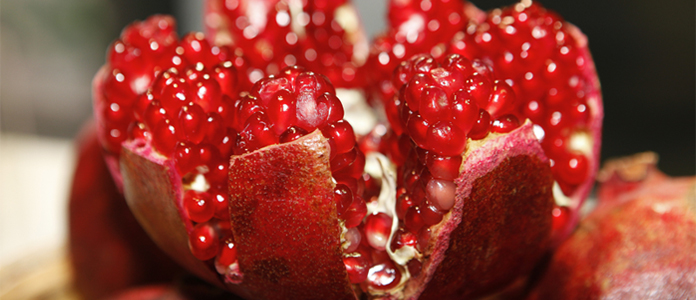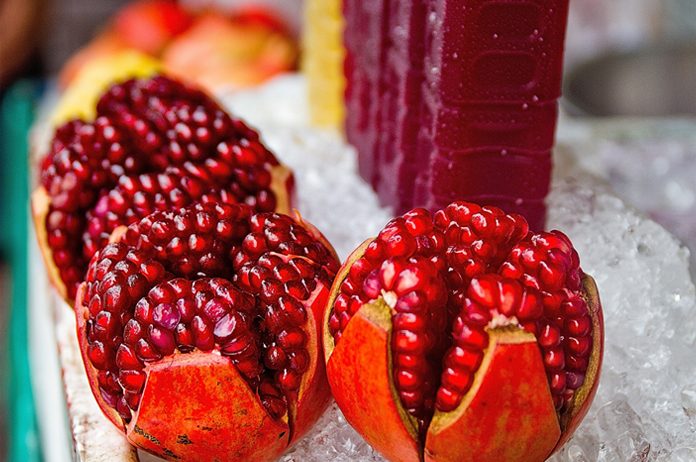Pomegranates are a pretty fruit stuffed with slippery lustrous red ruby pearls called arils which contain sweet, juicy and refreshing nectar that surrounds a white seed in the
Cutting the tough exterior of
But, it is time that one must learn to embrace and
It comes with a plethora of benefits like it helps protect the heart and prevents cancer growth, and these features make them impressive as a fruit.
Also known as ‘grenade’ in French, ‘Raman’ in Arabic, and ‘near in Hindi, the pomegranate fruit is equally delicious and nutritious. If you know properly how to eat a pomegranate, you can save time and effort by eating it as a vital nutritious snack. Depending upon the harvest, the season of this fruit usually runs from October to February.
How to Eat a Pomegranate?
At the store, look for pomegranate that feels heavy and undamaged. The skin is very thick and does its job of protecting the fruit, so few blemishes are completely possible.
- Cut the crown or the tip of the fruit with a sharp knife.
- Then score cuts on the fruit as if it will break into equal quarters.
- Soak it in cold water that will make the fruit softer and easier to collect the seeds.
- While, the pomegranate is immersed in water, pull it apart in quarters.
- Now, gently run your fingers or a spoon to collect the shiny arils with white seeds in each. The white pith will detach from the seeds and float to the top, and the seeds will sink to the bottom.
- Now, strain out the arils to leave out the other parts. Now you are all ready to enjoy the goodness of pomegranates.
Can you Eat Pomegranate Seeds?
Despite some common opinions, pomegranate seeds can be eaten, and they are great for your health too! Pomegranate seeds are the seeds found in the pomegranate fruit, which origins from the Punica granatum tree.

Pomegranate seeds are enclosed in tiny red arils. The arils and crunchy white seeds inside them are the only edible portions of the pomegranate.
It is safe to chew and swallow the seeds along with the juicy arils. Rather, some of you might enjoy the variations in texture.
Still, if you do not want to eat the seeds, you can spit them out as you would when eating seeded watermelons or other citrus fruits. Pomegranate seeds are gifted with a few incredible benefits, making you want to have them.
Pomegranate Seeds Nutrition
Pomegranate seeds are low in calories, high in vitamins, high in dietary fibre and phytochemicals. The seeds contain folate, manganese, phosphorous, iron, potassium, copper, calcium, vitamin C, vitamin K, and vitamin E.
These qualities aid in weight management. Per serving also offers more than 10% of your dietary fibre needs for the day, along with various polyphenolic compounds, tannins, volatile acids, and antioxidants that can affect your health in various ways.
Benefits of Pomegranate Seeds
The significant benefits of pomegranate seeds include their ability to improve skin appearance, reduce inflammation, help in weight management, promote heart health, and boost memory, among many others.
1. Skin Care
The pomegranate seeds can prevent wrinkles and age spots while keeping your skin youthful, glowing and tight even as you age. The seeds are packed with rich antioxidants.
2. Prevent Inflammation
Some of the tannins and phenolic compounds in the pomegranate seeds are known to reduce the immune response to inflammatory triggers, helping to reduce pain and irritation.
3. Boost Memory
Antioxidants present in these seeds have been related to boosting cognition and lowering the risk of neurodegenerative diseases. Patients who drank pomegranate juice had significantly improved verbal and visual memory. Including pomegranates in the diet might help delay the start or slow progress of Alzheimer’s disease.
4. Reduce Cardiovascular Issues
The dietary
The juice of pomegranate seeds contains different antioxidants and bioactive polyphenols reported to better cardiovascular health, including proper blood pressure levels, through several mechanisms. Weight Management
Since they are relatively low in calories and fat but full of fibre, water, and B vitamins, these seeds can fill you up and speed up the metabolism to increase weight loss efforts.
5. Natural Aphrodisiac
Pomegranates have been associated with fertility in several cultures. In addition to the positive effects on blood pressure, pomegranate seeds help elevate testosterone, increasing libido.
6. Reduce Arthritis & Joint Pain
Pomegranates are the source of antioxidants called flavonols, which act as anti-inflammatory agents in the body. This helps to reduce the problems of arthritis and joint pain which augments with age.
7. Fights Cancer
Many researchers have shown that pomegranate seeds are potent cancer-fighting food. Pomegranate has been shown to have antitumor effects on various types of cancer cells. Moreover, they are rich in phytochemicals that are anti-cancerous.
8. Fights Bacterial Infection
Pomegranates contain various bioactive compounds, including ellagic acid, ellagitannins, punicic acid, flavonoids, anthocyanidins, anthocyanins, estrogenic flavonols, and flavones, which are some of the most crucial pomegranate beneficial compounds.
Pomegranates have been used since ancient times to treat several health conditions, including parasitic and microbial infections, diarrhoea, ulcers, aphthae, and respiratory complications. Pomegranate seeds have been suggested to stimulate probiotic bacteria, thus enhancing their beneficial effects at fighting bacterial infections.
Eating Pomegranate Seeds Side Effects
Eating pomegranate seeds, side effects are comparatively lesser as opposed to its several benefits. But, one must also be aware of some of the potential side effects, which include-
- Dangerously low blood pressure
- Complications of diabetes
- Gastrointestinal effects
- And potential allergic reactions
However, the majority of these complications occur due to consuming an excess amount of those pomegranate seeds. Anything in moderation is mostly good, so if you want to enjoy the advantages of pomegranate seeds, consume it only till a certain level.
However, discontinue having the seeds immediately if you experience moderate or severe allergic reactions or negative symptoms. The fruit or the arils are always good to consume and is considered one of the top Bible foods for their amazing healing power of both the body and mind.






